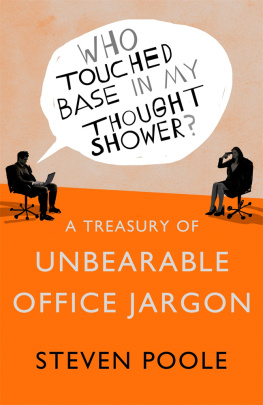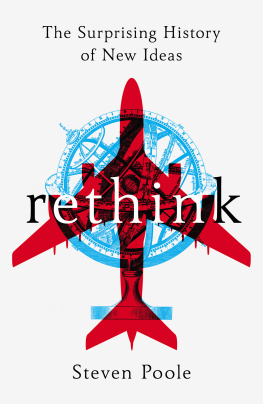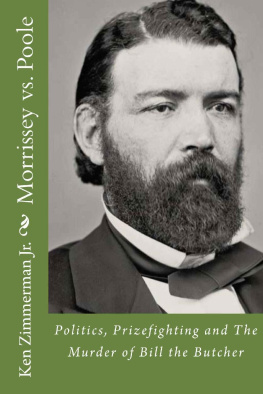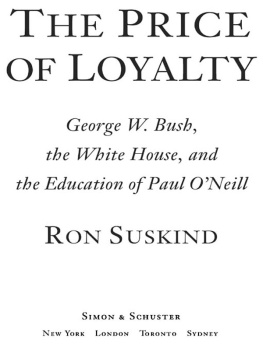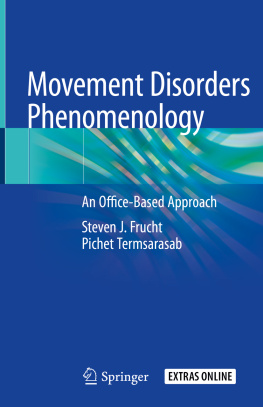Steven Poole - Who Touched Base in My Thought Shower? : A Treasury of Unbearable Office Jargon
Here you can read online Steven Poole - Who Touched Base in My Thought Shower? : A Treasury of Unbearable Office Jargon full text of the book (entire story) in english for free. Download pdf and epub, get meaning, cover and reviews about this ebook. year: 2013, publisher: Sceptre, genre: Romance novel. Description of the work, (preface) as well as reviews are available. Best literature library LitArk.com created for fans of good reading and offers a wide selection of genres:
Romance novel
Science fiction
Adventure
Detective
Science
History
Home and family
Prose
Art
Politics
Computer
Non-fiction
Religion
Business
Children
Humor
Choose a favorite category and find really read worthwhile books. Enjoy immersion in the world of imagination, feel the emotions of the characters or learn something new for yourself, make an fascinating discovery.
- Book:Who Touched Base in My Thought Shower? : A Treasury of Unbearable Office Jargon
- Author:
- Publisher:Sceptre
- Genre:
- Year:2013
- Rating:4 / 5
- Favourites:Add to favourites
- Your mark:
- 80
- 1
- 2
- 3
- 4
- 5
Who Touched Base in My Thought Shower? : A Treasury of Unbearable Office Jargon: summary, description and annotation
We offer to read an annotation, description, summary or preface (depends on what the author of the book "Who Touched Base in My Thought Shower? : A Treasury of Unbearable Office Jargon" wrote himself). If you haven't found the necessary information about the book — write in the comments, we will try to find it.
Steven Poole: author's other books
Who wrote Who Touched Base in My Thought Shower? : A Treasury of Unbearable Office Jargon? Find out the surname, the name of the author of the book and a list of all author's works by series.
Who Touched Base in My Thought Shower? : A Treasury of Unbearable Office Jargon — read online for free the complete book (whole text) full work
Below is the text of the book, divided by pages. System saving the place of the last page read, allows you to conveniently read the book "Who Touched Base in My Thought Shower? : A Treasury of Unbearable Office Jargon" online for free, without having to search again every time where you left off. Put a bookmark, and you can go to the page where you finished reading at any time.
Font size:
Interval:
Bookmark:
Steven Poole is the author of the books You Aren't What You Eat , Unspeak , and Trigger Happy and a journalist, cultural critic, broadcaster, and composer for documentaries and short films, including the award-winning EVOL. He writes for the Guardian , Edge , the New Statesman and the Times Literary Supplement.
Also by Steven Poole
You Arent What You Eat
Unspeak
Trigger Happy
Who Touched Base in my Thought Shower?
A Treasury of Unbearable Office Jargon
Steven Poole

www.sceptrebooks.co.uk
First published in Great Britain in 2013 by Sceptre
An imprint of Hodder & Stoughton
An Hachette UK company
Copyright Steven Poole 2013
The right of Steven Poole to be identified as the Author of the
Work has been asserted by him in accordance with
the Copyright, Designs and Patents Act 1988.
All rights reserved. No part of this publication may be reproduced,
stored in a retrieval system, or transmitted, in any form or by any
means without the prior written permission of the publisher, nor be
otherwise circulated in any form of binding or cover other than that
in which it is published and without a similar condition being
imposed on the subsequent purchaser.
A CIP catalogue record for this title is available from the British Library.
eBook ISBN 978 1 444 78436 7
Hardback ISBN 978 1 444 78184 7
Hodder & Stoughton Ltd
338 Euston Road
London NW1 3BH
www.sceptrebooks.co.uk
By means of the spectacle the ruling order discourses endlessly upon itself in an uninterrupted monologue of self-praise Guy Debord
I would prefer not to Bartleby the Scrivener
Contents
Preface
Among the most spirit-sapping indignities of modern life is the relentless battering of workers ears by the strangled vocabulary of office jargon. It might even seem to some innocent souls as though all you need to do to acquire a high-level job is to learn its stultifying vocabulary, GOING FORWARD . Office-speak is a maddeningly viral kind of Unspeak engineered to deflect blame, complicate simple ideas, obscure problems, and perpetuate power relations. Fluency in the idiom is a kind of cheap competence (or COMPETENCY ) that often masks a lack of competence in anything that matters.
Now, theres nothing wrong with jargon per se. You cant discuss quantum physics, for example, or the technical aspects of musical composition, without specialized terms that are incomprehensible to outsiders. The paradoxical thing about modern office jargon, though, is that it is a specialized language that is supposedly applicable to absolutely everything whether the office in question is in the field of broadcasting, advertising, manufacturing, banking, charitable fundraising, or anything else. Having noticed this, one might become rather suspicious about its alleged necessity. (Just as some insiders such as former consultant Matthew Stewart in The Management Myth are sceptical about the worth of management theory itself.)
When I first wrote about this abusive argot in 2013, my article became the most viewed page on the Guardian network globally, and within hours there were thousands of comments from frustrated office workers offering examples of their own pet verbal hates. Intriguingly, they spoke of their reaction to such language in terms of violence and illness. When they hear such buzzwords in the workplace, they want to stab someone in the eye with a pen, or they feel physically sick.
Workers resent in particular the emotional blackmail of modern office-speak, particularly the horrid cluster of TEAM -talk. Modern work, indeed, involves not just actual labour (being told to ACTION the DELIVERABLES ), but emotional labour as well. Employees of the fast-food chain Prt Manger are required to perform a list of Prt Behaviours that include has a sense of fun and is happy to be themself ( sic ). Prt workers are even encouraged to touch one another a lot. The workplace thus now insists on what Slavoj iek calls the superego injunction to enjoy not only must you do your job, you must actually be happy to do it, or at least be able to present a seamless simulacrum of doing so.
While people are increasingly ordered to be happy and think of their work as a kind of playtime, the language in which such orders are couched is dispiriting and alienating, prompting fantasies of ocular penetration with writing implements. People feel as though such jargon treats them as objects, just as the ubiquity of the term human resources (and even worse, HUMAN CAPITAL ) implies. (As Pepper Pottss head of security in Iron Man Three enthuses: The human part of human resources is our biggest vulnerability. We need to start phasing it out immediately.) Indeed, it turns out that ordinary people are more linguistically sensitive and discriminating than is often suspected by those who wield the power to choose the official dialect. Inspired by Dilbert, they play bullshit bingo in meetings; they sigh wearily when having to edit reports crammed with such deadening cant; they catch themselves using it too, and quietly despair.
The irresistible rise of modern office jargon has its origin in the beginnings of business theory in the 1950s and 1960s; it was fuelled by the later rise of the discipline of project management, and went viral during the dotcom boom of the late 1990s. Now it is everywhere, from cubicle farms that represent real-life versions of TV series The Office , to government press releases. (Margaret Thatcher was the rare politician of modern times who did not embrace management jargon: she referred to it with characteristic asperity as all this guffy stuff.) For the past three years, the website of Forbes magazine (not commonly thought to be a sneering leftie anti-business operation) has run a Jargon Madness tournament, inviting people to vote on the buzzwords that annoy them most. And yet the front-runners (e.g. in 2012, LEVERAGE ) do not magically disappear from business vocabulary.
Perhaps everyone is scared that if they dont speak the same way, no one will take them seriously. Surveys over the last decade have repeatedly found that workers and managers alike claim to hate jargon: one concluded that it results in mistrust and encourages a feeling of inadequacy. But no one is ready to give it up. A 2012 poll found that more than three-quarters of Britons are annoyed by office jargon, but 44 per cent still admit to using it: presumably some of the others were too ashamed to confess. The pollsters speculated that the incontinent buzzphrasing of desperate contestants on The Apprentice and Dragons Den had made it even more ubiquitous.
Thrusting executives also need to talk the talk. Patrick Gray, a consultant, told Forbes : Theres a thieves code in the corporate world: Ill use words that sound important but make no actual sense and give you the same privilege if you dont call me out on it. John Rentoul, the witty anti-cant crusader and author of The Banned List , suggests that terms such as SYNERGY and THINKING OUTSIDE THE BOX are just fancy ways of saying simple things, or saying nothing much at all... they are used in the vain hope that their fanciness will convey a dynamism or sophistication that the writer or speaker fears is lacking. If so, the consequences of this unspoken conspiracy of fear are woeful indeed.
Certainly a lot of office jargon is engineered to jolly its targets along by making the fluorescent-lit days sound more exciting and important. To do so, it steals terms from the military ( ON MY RADAR , PUSH THE ENVELOPE , STRATEGY ), sport ( DEEP DIVE , CLOSE OF PLAY ), information technology ( DELIVERABLES , DRILL DOWN ), or science ( OPTICS , PARADIGM SHIFT ), while happily abandoning the specific technical meanings that made such words useful in the first place. But office jargon has darker and more brutalizing tendencies, too. This language tends to dehumanize workers, treating them as computers or robots ( DOWNLOAD , BANDWIDTH , INTERFACE ), at the same time as it forces on them a kind of wheedling, unwelcome intimacy ( TOUCH BASE , REACH OUT ), condescends to them as if they were children ( BUCKETS , HANDS AND FEET ), and obscures management responsibility for things that have gone wrong or might go wrong in the future ( GOING FORWARD , ISSUES , RISK ). It is at its most insistently creative, tellingly, when dreaming up euphemisms for sacking people ( DEMISING , RESIZING ), which makes office jargon a kind of wonderfully impermeable condom for the executive conscience.
Next pageFont size:
Interval:
Bookmark:
Similar books «Who Touched Base in My Thought Shower? : A Treasury of Unbearable Office Jargon»
Look at similar books to Who Touched Base in My Thought Shower? : A Treasury of Unbearable Office Jargon. We have selected literature similar in name and meaning in the hope of providing readers with more options to find new, interesting, not yet read works.
Discussion, reviews of the book Who Touched Base in My Thought Shower? : A Treasury of Unbearable Office Jargon and just readers' own opinions. Leave your comments, write what you think about the work, its meaning or the main characters. Specify what exactly you liked and what you didn't like, and why you think so.

